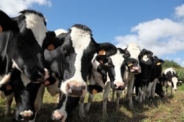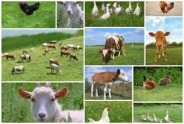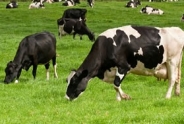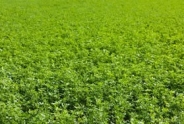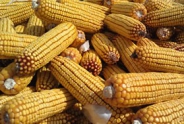Ration Tips for Using Distillers Grains
Jerry Bertoldo, Dairy
Northwest New York Dairy, Livestock & Field Crops
The nutritionist may work for a feed company or as an independent consultant. The person is undoubtedly familiar with the particulars of dry distillers grains (DDGS) but might not recommend putting it into your ration. Poor results in the past from highly variable DDGS make some nutritionists take a "wait-and-see" strategy concerning local distillers.
Livestock farmers who don't use a nutritionist miss the luxury of having someone sort out the details that lead to a reasonable decision on whether or not to feed distillers. There are lots of calf raisers and back-yard beef operators who could feed the product, but they need some guidelines. That's the purpose of this article: to give some tips on feeding DDGS and offer you opportunities to save money and get good performance results.
Thumb rules for DDGS use
- Limit DDGS to a maximum of 40% og diet dry matter (DM) in finishing steers, 20% in dairy heifers and 10% of dairy rations. These recommendations are based on DDGS being 12 to 14% fat. With lower fat DDGS, you can include more in dairy diets.
- In growing or milking cattle you cannot replace all the cornmeal in a diet with DDGS unless you feed high levels of corn silage.
- If DDGS represents a high percentage of the diet protein, you must use other protein sources with significant lysine content such as soybean, fish or blood meal.
- If hay crop is the main forage source, particularly as dry hay, and distillers is maxed out, attention to rumen available nitrogen or degradable protein is important. You can add urea to the diet.
- Including DDGS with a base of good corn silage and/or high quality hay or haylage will result in a ration high in energy. While this is a good formula for finishing steers, growing heifers will trend towards excessive body condition.
- Calcium supplementation is essential in growing animals with high DDGS inclusions rates.
Upcoming Events
2026 Forage Congress
March 12, 2026
Nunda, NY
Due to the unprecedented winter storm that recently impacted travel conditions across the region and U.S., combined with extreme cold temperatures and associated safety concerns, Forage Congress was postponed out of an abundance of caution. This decision was made with the safety of our participants, speakers, staff, and venue partners as the highest priority.
We are pleased to officially announce that Forage Congress has been rescheduled for Thursday, March 12, 2026, and will be held at The Nunda Ranch as originally planned.
Address: 2278-NY 436, Nunda, New York 14517
Sponsorship opportunities, vendor participation, and event registration are now open. We are excited to reconvene this important educational program and look forward to welcoming producers, industry partners, and speakers for a full day of applied, research-based forage systems programming.
From Dry to Fresh: Transition Cow Management Training
March 12, 2026
Albion, NY
This is a 1-day hands-on training in transition cow management offered in English and Spanish.
TENTATIVE- 2026 Dairy Feeder School - November 2026
November 11 - November 12, 2026
Dates are TENTATIVE for 2026! More Details to Come!
Join the Regional Dairy Specialists for a one day on-farm training for dairy farm feeders. The training will be offered in English and Spanish and will feature stations with hands-on activities and demonstrations.

